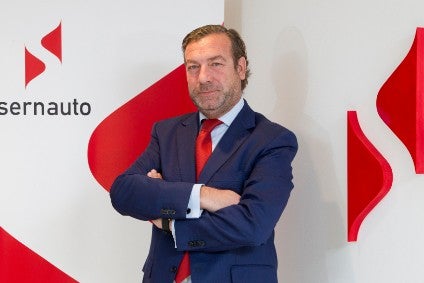
Spanish suppliers association CEO, José Portilla has had many years experience in manufacturing sectors such as steel and automotive, while he is now CEO of Spanish suppliers association, Sernauto. Simon Warburton caught up with him as Spain looks to address the twin challenges of slowing global demand and the transition to new mobility.
Portilla has also been Deputy Vice-Minister of Government Affairs of the Government’s Presidency of the Principality of Asturias and, in the last stage, managing partner of a Government Affairs consultancy, specialised in the internationalisation of Spanish SMEs in the areas of industry, energy and infrastructure.

Discover B2B Marketing That Performs
Combine business intelligence and editorial excellence to reach engaged professionals across 36 leading media platforms.
Since January, 2017, he has been a member of the boards of CLEPA and CEOE (Confederación Española de Organizaciones Empresariales).
j-a: Spain has had multiple general elections during the past few years – given the importance of the automotive sector contributing 10% to GDP – although behind tourism – how does Sernauto view the formation of any new administration?
JP: We are really hungry for a government – they are still negotiating. We still do not know whether we will have a government next week [and] we don’t discard new elections in November.
Two years ago, we were almost one year without a government though the economic outcomes were going well. I have to say concerning Reyes Maroto [acting Industry Minister], she has quite a good understanding of the sector and is showing a big compromise with the sector, both with OEMs as well as with component manufacturers.
j-a: Is this having an impact on funding in Spain?
JP: We do not have a government at this stage – we are wait [ing for] an extended budget. This means we are not able to tackle or have access to specific members or pockets of money, so we are really looking to have a government as soon as possible and have a normal budget.
The Minister has said there will be specific amounts for fostering competitiveness [and] to scrap [old] cars for transition [and] especially when we are facing the highest regulations in history for the sector. We are not asking for subsidies, we are asking for a long term country strategy, like there is in France or Germany to tackle difficult aspects like the fostering of R&D.
j-a: Should the horse-trading in Madrid finally come to an end, what are the various levers an incoming Spanish administration could pull when it comes to your industry and can it unite the regions of the country behind a national policy?
JP: We are really hoping the government is in place as soon as possible. We want to style a national automotive agreement where Sernauto, Anfac [Spanish automotive association], the distribution [sector] and high members of the government would be working in specific working groups.
j-a: Spain has been successful at attracting overseas suppliers and OEMs to what is now a EUR37.17BN (US$42bn) industry. Is there any suggestion Spain operates a ‘low-cost’ culture in terms of employee wages to tempt companies to locate here?
JP: We are not any more a low-cost country. We are high-cost in line with France, Germany and the UK, [however] it is true we remain competitive. We [also] have one important weapon: social dialogue. There is an understanding we have to defend this industry. The workforce brings flexibility – they are very qualified.
j-a: There are myriad challenges facing the industry, from CASE technologies to external influences such as potential tariffs and trade wars. How do you view the rapidly changing landscape?
JP: I am talking about Spanish multinationals as well as foreign multinationals [who] are well prepared and have already been developing new technologies for electrification for the last five to six years. For SMEs [however], there is a big gap.
As an Association and government, we are helping the SMEs to make the transition to move into Industry 4.0, digitalisation and to move abroad. We are trying to foster those technologies. Exports are very, very important. We are present in five continents.
j-a: There seems to be almost constant friction between the trading blocks of the US and China with on/off threats of tariffs. Does that concern you?
JP: This uncertainty is not good. This is definitely impacting and providing this uncertainty. On the other hand China is slowing down, Europe is slowing down.
j-a: One of the other great challenges looming on the horizon is the UK’s imminent departure from the European Union. What is Sernauto’s policy and do you work with your British counterparts on the issue?
JP: We have been meeting the British Embassy [in Spain for the] past two-and-a-half years. I could make a difference between big companies which have more resources – they have plans to face a hard Brexit. On the contrary, SME’s which are already exporting to the UK, they have not implemented these plans.
We are very well connected with the SMMT. What the SMMT has been saying to the UK is exactly the same as the rest of the European countries.
We definitely want an agreement, we don’t want commercial barriers. We have more than 25 factories in the UK of our suppliers; we don’t want fiscal pressures for Spain, for Europe and the UK. It is a crucial industry.
Between January and April of 2019, Spanish automotive equipment and components were exported for a value of EUR7.3bn, a stable performance in relation to the same period of the previous year (+ 0.8%).
The EU continues to be the main destination market for Spanish exports of components, with a market share of 72.5% of sales. Sales increased 1.05% compared to the same period of the previous year, standing at EUR5.3bn.
The UK, fourth destination for Spanish exports, had a negative growth rate, falling by 2.24% and standing at EUR522m.






